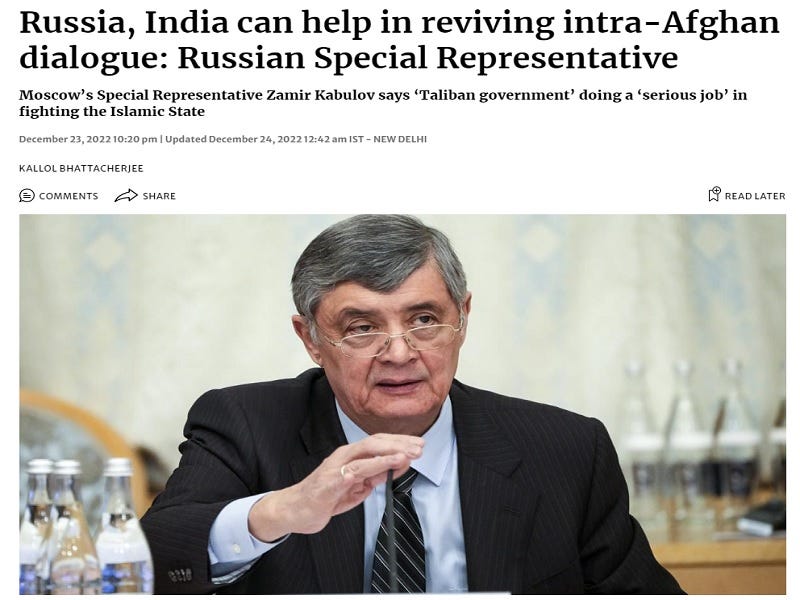Zamir Kabulov’s Interview With The Hindu Symbolizes Russia’s Grand Strategic Recalculations
The US-orchestrated post-modern coup’s neutralization of Pakistan’s previously promising geostrategic potential in the emerging Multipolar World Order coupled with India’s redoubling of its strategic partnership with Russia in defiance of the US compelled Russia to recalibrate its grand strategy with respect to the Ummah Pivot’s role therein, hence the replacement of Pakistan with Iran as its envisaged leader and this policy’s subsequent convergence with India.
Russian special presidential representative on Afghanistan Zamir Kabulov just gave an interview to The Hindu, one of India’s leading media outlets, that’s much more important than most observers might realize. He’s the mastermind of his country’s “Ummah Pivot” that hitherto sought to optimize Russia’s Eurasian balancing act between China and India by prioritizing relations with majority-Muslim countries in order for them to form a third collective force of influence for Moscow to triangulate between.
Kabulov initially envisaged Pakistan playing the leading role in this respect, but the US-orchestrated post-modern coup against its former multipolar Prime Minister Imran Khan and that country’s subsequent reversion to once again becoming its traditional patron’s vassal scuttled those plans. Nowadays Iran has replaced Pakistan’s role in this grand strategic framework since the North-South Transport Corridor (NSTC) that transits across its territory has become indispensable for Russia.
Furthermore, instead of Russia expecting the Ummah Pivot to help it balance relations between China and India, they and their newfound Iranian leader in this paradigm are strategically converging with India to bolster Russia’s balancing capabilities vis a vis China and the US. Russia, India, and Iran are now jointly creating a third pole of influence for breaking through the bi-multipolar impasse of International Relations characterized by the Sino-American superpower duopoly’s disproportionate influence.
The NSTC is the economic core of their related efforts, hence its outsized importance in Russian grand strategy since the special operation started in late February and the reason why President Putin referenced it twice in just seven days this month. Meanwhile, the diplomatic manifestation of this emerging trilateral pole of influence is embodied in the Troika that those three countries unveiled last month on Afghanistan, which is intended to balance the Chinese-Pakistani duopoly there.
It was with this context in mind that Kabulov surprised most observers by suggesting in his interview with The Hindu that Russia and India can jointly facilitate intra-Afghan talks. His exact words were that “Russia is ready to provide necessary assistance in this regard if such a signal comes from Kabul. We are convinced that India’s role in it will also be required”, which is a reversal of his prior unstated Pakistani-centric policy with respect to the Ummah Pivot and using Islamabad to balance Delhi in the region.
The US-orchestrated post-modern coup’s neutralization of Pakistan’s previously promising geostrategic potential in the emerging Multipolar World Order coupled with India’s redoubling of its strategic partnership with Russia in defiance of the US resulted in this volte-face. These developments accordingly compelled Russia to recalibrate its grand strategy with respect to the Ummah Pivot’s role therein, hence the replacement of Pakistan with Iran as its envisaged leader and this policy’s subsequent convergence with India.
It's for this reason why Kabulov’s interview with The Hindu is so symbolic since he’s the face of Russia’s Ummah Pivot and its prior Pakistani-centricity, yet now he’s publicly calling for his country to jointly work with India in Afghanistan, the same place that was responsible for the previously rapid Russian-Pakistani rapprochement of the past decade prior to it stalling after this year’s post-modern coup. This more so than anything else shows just how much Russia’s grand strategy has changed in the past year.


